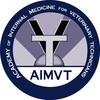Neurology
Neurology is defined as the specialty branch of veterinary medicine concerned with the study, care and treatment of medical and surgical diseases of the nervous system. This includes the central, peripheral, and autonomic nervous systems. All specialties of AIMVT are further defined to include the advanced knowledge of wellness and preventative medicine, a detailed knowledge of complex, acute and chronic disease states, and a thorough knowledge of the anatomy, pathology and pathophysiology of animals.
The petition was submitted to the CVTS of NAVTA in April 2010, accepted in July 2010, and the first exam was held in June 2011 in Denver, Colorado. If you are interested in applying for your specialty in neurology, please complete the Intent to Apply form to place your information in the database.
Technicians within the discipline of Neurology are required to treat disease processes and the secondary complications that may accompany that disease. Patients are often recumbent or non-ambulatory making communication and client education imperative. Veterinary technicians working in neurology should be proficient in the following areas. (Please reference the skills and knowledge links for an all-inclusive list.)
Neurology is defined as the specialty branch of veterinary medicine concerned with the study, care and treatment of medical and surgical diseases of the nervous system. This includes the central, peripheral, and autonomic nervous systems. All specialties of AIMVT are further defined to include the advanced knowledge of wellness and preventative medicine, a detailed knowledge of complex, acute and chronic disease states, and a thorough knowledge of the anatomy, pathology and pathophysiology of animals.
The petition was submitted to the CVTS of NAVTA in April 2010, accepted in July 2010, and the first exam was held in June 2011 in Denver, Colorado. If you are interested in applying for your specialty in neurology, please complete the Intent to Apply form to place your information in the database.
Technicians within the discipline of Neurology are required to treat disease processes and the secondary complications that may accompany that disease. Patients are often recumbent or non-ambulatory making communication and client education imperative. Veterinary technicians working in neurology should be proficient in the following areas. (Please reference the skills and knowledge links for an all-inclusive list.)
- Ability to obtain an accurate and complete neurologic history
- Ability to perform a thorough neurologic examination and to understand the principles of lesion localization between brain, spinal, and neuromuscular disorders
- Ability to understand a variety of common and breed specific diseases of the brain, spine and neuromuscular system
- Ability to recognize common neurotoxins and be familiar with treatments of each of these disorders
- Ability to recognize subtle mentation changes in a critical neurologic patient
- Ability to understand basic seizure principles, including anti-epileptic medications
- Ability to assist with CSF taps, joint taps, muscle/nerve biopsies and handle all samples accordingly
- Ability to accurately identify anatomy in spinal radiographs, myelograms, CT and MRI scans and recognize abnormal pathology
- Ability to perform or assist with EMG, EEG, NCV, and BAER tests
- Ability to manage patients who have had spinal or intracranial surgery and perform rehabilitative techniques and principles
- Ability to assist in a variety of spinal or cranial surgeries and properly identify various neurologic surgical instruments
- Ability to thoroughly communicate with clients regarding their pet's neurologic disease and accurately explain any aftercare necessary including physical therapy, medications and their potential side effects
